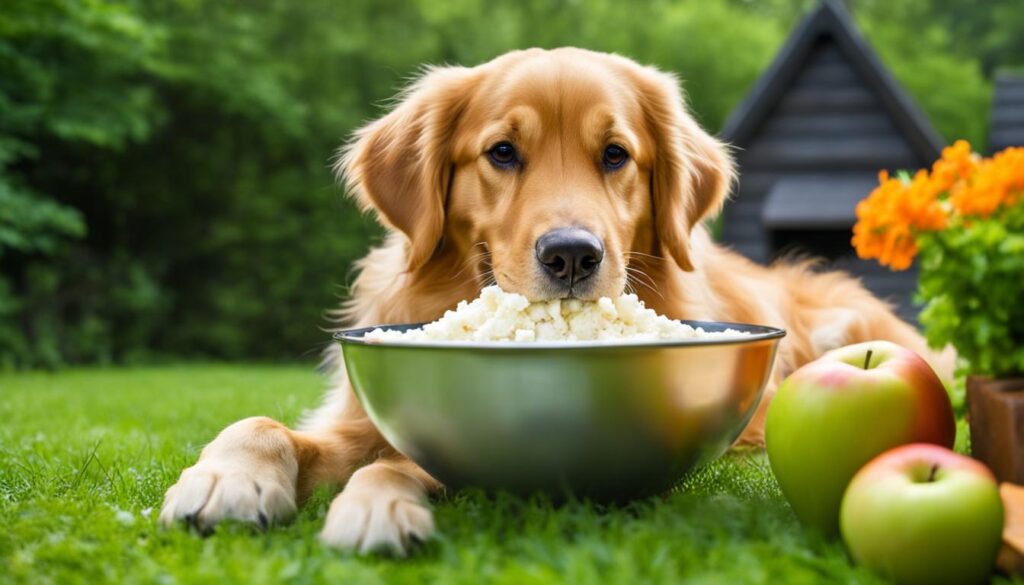Can Dogs Eat Cottage Cheese? Find Out Here!
Cottage cheese is a popular dairy product enjoyed by many people, but can dogs eat it too? If you’re wondering whether cottage cheese is safe and beneficial for your furry friend, you’ve come to the right place. In this article, we’ll explore the topic of feeding cottage cheese to dogs and provide you with the information you need to make an informed decision about including it in your dog’s diet.
Key Takeaways:
- Cottage cheese can be safely enjoyed by dogs in small amounts as an occasional treat.
- It is a good source of calcium, protein, and vitamins for your dog’s overall health.
- When introducing cottage cheese to your dog’s diet, start with small portions and choose the right type for their specific needs.
- Monitor your dog for any potential digestive issues or allergic reactions when feeding them cottage cheese.
- Always consult with a veterinarian before making any significant changes to your dog’s diet.
Understanding the Nutritional Value of Cottage Cheese for Dogs
Cottage cheese provides numerous health benefits for dogs, making it a valuable addition to their nutrition. Packed with essential nutrients, such as calcium, protein, and vitamins B12, D, and E, cottage cheese supports overall body health in dogs.
Calcium is crucial for strong bones, teeth, and muscles, while protein supports muscle growth and repair. Cottage cheese is a great source of easily digestible protein for dogs, ensuring efficient nutrient absorption and utilization.
The vitamins present in cottage cheese, specifically B12, D, and E, act as immune system boosters. These vitamins help strengthen the immune response, supporting dogs’ defense against illnesses and infections.
The nutritional value of cottage cheese makes it particularly beneficial for dogs on a plant-based diet. It serves as a high-protein source, ensuring that dogs receive the necessary nutrients for optimal health.
In addition, cottage cheese can aid in weight management for dogs. It is low in fat and calories, making it a suitable option for dogs that need to lose or maintain weight.
Cottage cheese also plays a crucial role in promoting bone health in dogs. The calcium content helps maintain strong and healthy bones, reducing the risk of fractures and other bone-related issues.
Overall, cottage cheese acts as a healthy treat for dogs and can be incorporated into their diet to provide essential nutrients and support their overall well-being.

| Nutrient | Function |
|---|---|
| Calcium | Strengthens bones, teeth, and muscles |
| Protein | Aids in muscle growth and repair |
| Vitamin B12 | Boosts the immune system |
| Vitamin D | Supports immune function |
| Vitamin E | Acts as an antioxidant, protecting cells |
How to Safely Feed Cottage Cheese to Your Dog
When it comes to feeding cottage cheese to your beloved canine companion, there are a few important factors to consider. By following these tips and guidelines, you can ensure that your dog enjoys cottage cheese safely and receives all the nutritional benefits it offers.
Start Slow and Choose the Right Variety
When introducing cottage cheese to your dog’s diet, it’s essential to start slowly. Begin by offering small portions and monitor your dog’s reaction. This gradual introduction can help prevent any potential digestive issues that may arise from a sudden dietary change.
Furthermore, it’s crucial to choose the right kind of cottage cheese for your dog. Look for low-fat, unsalted, organic, or lactose-free options. These varieties are healthier and devoid of additives such as sugar or artificial flavors, making them a safer choice for your furry friend.
Incorporate Cottage Cheese into Your Dog’s Food
There are various ways to incorporate cottage cheese into your dog’s food. You can mix it with their regular food to enhance nutrition and add moisture. This is particularly beneficial if your dog has a dry kibble diet, as cottage cheese can help alleviate the dryness and provide a flavorful twist.
Alternatively, you can serve cottage cheese as a topping on a lick mat. This can keep your dog engaged and entertained while also allowing them to enjoy the taste and texture of cottage cheese.
Tip: Take into consideration your dog’s specific dietary needs and consult with a veterinarian if necessary. They can provide guidance on portion sizes and any additional precautions specific to your dog’s health.
Be Mindful of Portion Sizes and Balance
While cottage cheese is a healthy addition to your dog’s diet, it’s important to avoid overfeeding. Cottage cheese should be given in moderation to maintain a balanced diet for your dog. Excessive consumption can lead to weight gain and potential digestive issues.
As a general guideline, consult your veterinarian to determine the appropriate portion size based on your dog’s size, age, and activity level. Ensuring that cottage cheese is part of a well-rounded diet for your dog can help them receive the maximum benefits without any negative effects.
Table: Tips for Safely Feeding Cottage Cheese to Your Dog
| Tip | Description |
|---|---|
| Start Slowly | Introduce cottage cheese gradually to avoid digestive upset. |
| Choose the Right Variety | Opt for low-fat, unsalted, organic, or lactose-free cottage cheese. |
| Mix with Regular Food | Incorporate cottage cheese into your dog’s meals for added nutrition and moisture. |
| Serve on a Lick Mat | Offer cottage cheese as a topping on a lick mat to provide mental stimulation and enjoyment. |
| Control Portion Sizes | Avoid overfeeding and consult your veterinarian for appropriate portion sizes. |
| Maintain Balance | Ensure cottage cheese is part of a well-balanced diet for your dog. |
By following these feeding tips and guidelines, you can safely and effectively incorporate cottage cheese into your dog’s diet. Always remember to monitor your dog’s health and consult with a veterinarian for any specific concerns or dietary considerations.

Cottage Cheese Recipes for Dogs
Looking to treat your furry friend to some tasty and nutritious meals? Here are a few simple cottage cheese recipes that are sure to make your dog’s tail wag with delight!
1. Homemade Ground Beef and Egg Delight
Ingredients:
- 1/2 pound ground beef
- 1 egg
- 1/4 cup cottage cheese
Instructions:
- Cook the ground beef in a pan until fully browned and no longer pink.
- In a separate bowl, beat the egg and mix it with the cooked ground beef.
- Add cottage cheese to the mixture and stir until well combined.
- Serve the delicious homemade ground beef and egg delight to your pup!
2. Refreshing Cottage Cheese Ice Cream
Ingredients:
- 1 cup cottage cheese
- 1 ripe banana
- 1 tablespoon honey
Instructions:
- In a blender, combine the cottage cheese, ripe banana, and honey.
- Blend until smooth and creamy.
- Pour the mixture into ice cube trays or silicone molds.
- Freeze for a few hours or until solid.
- Serve the refreshing cottage cheese ice cream to your dog on a hot day!
3. Essential Nutrient Mix for Home-Cooked Meals
Ingredients:
- 1 cup cottage cheese
- 1/2 cup cooked quinoa
- 1/2 cup steamed carrots, chopped
- 1/4 cup pumpkin puree
- 1 tablespoon flaxseed meal
Instructions:
- In a mixing bowl, combine all the ingredients.
- Stir until well mixed.
- Store the essential nutrient mix in an airtight container in the refrigerator.
- Use a spoonful of the mix as an addition to your dog’s home-cooked meals.
These cottage cheese recipes are not only delicious but also packed with nutrients that your dog will love. Remember to use these recipes in moderation and ensure they are balanced with other components of your dog’s diet.

| Recipe | Ingredients | Instructions |
|---|---|---|
| Homemade Ground Beef and Egg Delight | 1/2 pound ground beef 1 egg 1/4 cup cottage cheese |
Cook ground beef until browned. Beat egg and mix with cooked ground beef. Add cottage cheese and stir. |
| Refreshing Cottage Cheese Ice Cream | 1 cup cottage cheese 1 ripe banana 1 tablespoon honey |
Blend cottage cheese, ripe banana, and honey until smooth. Pour into molds and freeze. |
| Essential Nutrient Mix for Home-Cooked Meals | 1 cup cottage cheese 1/2 cup cooked quinoa 1/2 cup steamed carrots, chopped 1/4 cup pumpkin puree 1 tablespoon flaxseed meal |
Combine all ingredients and store in the refrigerator. Use as an addition to home-cooked meals. |
Possible Side Effects of Feeding Cottage Cheese to Dogs
While cottage cheese can provide nutritional benefits to dogs, it’s important to be aware of possible side effects. Every dog is unique, and some dogs may react differently to certain foods. Here are some possible side effects to watch out for when feeding dogs cottage cheese:
- Digestive Issues: Cottage cheese contains high levels of fat and lactose, which can be difficult for some dogs to digest. Feeding large amounts of cottage cheese or giving it to dogs with sensitive stomachs may cause diarrhea, gas, or upset stomach.
- Weight Gain: Cottage cheese, although low in fat, is still calorie-dense. If fed in excessive amounts, especially to dogs prone to obesity, it can contribute to weight gain. It’s essential to consider your dog’s overall calorie intake and adjust portion sizes accordingly.
- Allergic Reactions: Dogs can develop allergies or sensitivities to certain foods, including cottage cheese. Signs of an allergic reaction may include itching, redness, swelling, and difficulty breathing. If your dog shows any of these symptoms after consuming cottage cheese, discontinue feeding it and consult with your veterinarian.
- Interference with Medications: Cottage cheese can interfere with the absorption of certain medications and supplements in dogs. If your dog is on any medications, it’s crucial to consult with your veterinarian before adding cottage cheese to their diet.
- Calcium Imbalance: Cottage cheese is a good source of calcium, but excessive intake can lead to imbalances and health issues. Dogs with certain medical conditions, such as kidney problems or a history of bladder stones, may be more susceptible to these imbalances.
By monitoring serving sizes, introducing cottage cheese gradually, and consulting with a veterinarian, you can help mitigate the potential side effects of feeding cottage cheese to your dog.
Quick Tips:
When feeding cottage cheese to your dog, remember these tips:
- Start with small portions to assess your dog’s tolerance and prevent digestive upset.
- Choose cottage cheese varieties that are low in fat, unsalted, organic, or lactose-free, based on your dog’s specific needs.
- Monitor your dog’s weight and adjust portion sizes to maintain a healthy body condition.
- If your dog shows any signs of an allergic reaction or discomfort, discontinue feeding cottage cheese and consult with your veterinarian.
- If your dog is on any medications or supplements, consult with your veterinarian before adding cottage cheese to their diet to prevent potential interactions.
| Possible Side Effects | Prevention |
|---|---|
| Digestive Issues (diarrhea, gas, upset stomach) | Feed cottage cheese in moderation and choose low-lactose options for sensitive stomachs. |
| Weight Gain | Monitor portion sizes and consider your dog’s overall calorie intake. |
| Allergic Reactions (itching, redness, swelling, difficulty breathing) | Discontinue feeding cottage cheese if signs of an allergic reaction occur. Consult with a veterinarian for further guidance. |
| Interference with Medications | Consult with a veterinarian before adding cottage cheese to your dog’s diet if they are on medications or supplements. |
| Calcium Imbalance | Avoid excessive intake of cottage cheese, especially for dogs with specific medical conditions. Consult with a veterinarian for appropriate portion sizes. |
Conclusion
Feeding cottage cheese to your dog can be a nutritious and delicious addition to their diet when done correctly. It offers essential nutrients like calcium, protein, and vitamins that promote overall body health. Cottage cheese can be incorporated into meals or served as an occasional treat, providing variety and taste to your furry friend’s meal plan.
When introducing cottage cheese to your dog, it’s crucial to start with small portions and gradually increase them to avoid digestive issues. Choose the right type of cottage cheese for your dog, considering factors such as fat content, salt levels, and lactose intolerance. Consulting with a veterinarian will help ensure that you’re making the best dietary choices for your pet.
While cottage cheese provides numerous benefits, it’s important to be aware of potential side effects. Some dogs may experience digestive problems or weight gain if overfed. Allergic reactions, interference with medications, and calcium imbalances are also possible concerns. Monitoring serving sizes and keeping an eye on your dog’s overall health is essential.
In conclusion, feeding your dog cottage cheese can contribute to their overall nutrition, as long as it is done in moderation and with proper consideration. Always consult with a veterinarian before making any changes to your dog’s diet to ensure their specific dietary needs are met. By following these guidelines, you can safely incorporate cottage cheese into your dog’s meal plan and provide them with a healthy and enjoyable snack option.
FAQ
Can dogs eat cottage cheese?
Yes, dogs can safely enjoy cottage cheese in small amounts as an occasional treat.
What is the nutritional value of cottage cheese for dogs?
Cottage cheese is rich in essential nutrients like calcium, protein, and vitamins, which support a dog’s overall health.
How can I safely feed cottage cheese to my dog?
Start by introducing cottage cheese slowly, choose the right type for your dog, and monitor serving sizes to avoid potential side effects.
Can I add cottage cheese to my dog’s meal plan?
Yes, cottage cheese can be incorporated into a dog’s food by mixing it with dry kibble or used as a topping on a lick mat.
Are there any cottage cheese recipes for dogs?
Yes, there are various recipes available that incorporate cottage cheese and provide additional nutrients for dogs.
What are the possible side effects of feeding cottage cheese to dogs?
Possible side effects include digestive issues, weight gain, allergic reactions, interference with medications, and calcium imbalance.
Is it advisable to feed dogs cottage cheese?
Cottage cheese can be a healthy addition to a dog’s diet when fed in moderation and chosen with care. Always consult with a veterinarian before making any changes to your dog’s diet.

